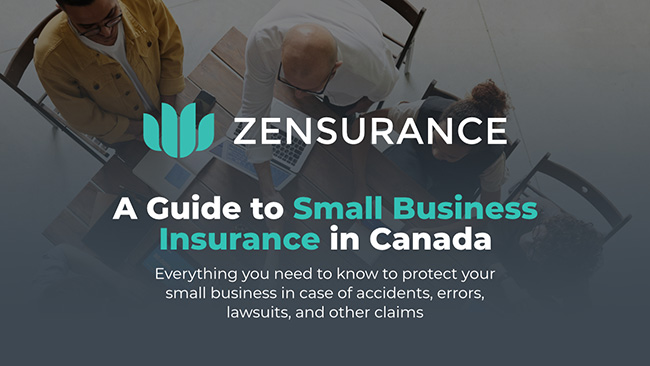It’s illegal to operate any motor vehicle in Canada without a valid insurance policy, but protecting your business vehicle from costly repair bills because of accidents or damages beyond your control requires the right type of insurance.
Any business vehicle should be covered by a commercial auto insurance policy. That’s because most private-passenger car insurance policies do not cover damage claims for trucks, SUVs, vans or pickups that are used for commercial use, or the coverage limits on a personal auto insurance policy may be insufficient to pay for accidents and damages involving a vehicle used for work.
Two optional coverages you can add to your commercial auto policy to up your protection that are worth considering are collision or upset insurance and comprehensive insurance.
Let’s review what a mandatory policy contains and what these optional coverages provide so you can decide if you need one or both.

Related Posts
Sign Up for ZenMail
"*" indicates required fields
Categories
What Does a Mandatory or Basic Commercial Auto Insurance Policy Include?
What a mandatory or basic commercial auto insurance policy includes is determined by your provincial regulator.
Although there are differences between jurisdictions, most mandatory policies contain the same coverages and minimum coverage limits.
For example, in Ontario, a minimum, mandatory policy includes:
- Third-party liability coverage with $200,000 of coverage (you can increase the amount to $500,000, $1 million, or $2 million). It pays for damages where you are responsible or at fault for an accident resulting in third-party property damage and injuries to or death of another person up to the coverage limit.
- Accident benefits cover your medical expenses if you are injured in a car accident, regardless of who is at fault for it. The minimum amount of coverage is $65,000 for non-catastrophic injuries and up to $1 million for catastrophic injuries. You have the option to increase these limits.
- Direct compensation-property damage (DCPD) allows you to file a claim directly with your broker or insurer following an accident that occurs in Ontario for which you are not at fault to pay for damages to your vehicle and its fixed contents (like the dashboard infotainment system). However, as of January 1, 2024, you can opt out of DCPD coverage in Ontario. But if you do and are involved in a collision for which you are deemed not at fault, you cannot file a claim with your insurance provider to pay for repairs to your wheels.
- Uninsured auto coverage pays for damages to your vehicle and your medical expenses if you’re injured or killed by a hit-and-run driver or uninsured motorist.
What Is Collision or Upset Auto Insurance?
Collision or upset auto insurance is an optional coverage that pays for losses to your vehicle following a collision with another vehicle, a stationary object (like a traffic light, a trailer attached to another car, the surface of the ground or an object on the ground), or if it rolls over in a crash, regardless of who’s at fault for the accident.
Collision insurance does not cover damages to your vehicle if it’s hit by another car while parked or if an object hits it, like a tree branch that falls on top of it.
Should You Get Collision or Upset Auto Insurance?
When deciding if you should include collision insurance on your vehicle’s policy, take into consideration the following:
- The value and age of your vehicle
- What the difference is between the deductible when filing a claim and the value of the car
- If you can afford to pay for a new vehicle if your existing one is a write-off or a total loss after an accident
- If the business vehicle you drive is leased or has financing on it, the terms of that contract may require you to have collision coverage
What Is Comprehensive Auto Insurance?
Comprehensive auto insurance covers damages caused by theft, vandalism, natural disasters, extreme weather, flying or falling objects (like a tree branch that snaps off a tree and smashes on top of your pickup), fire, or collisions with wildlife if an animal darts out in front of you unexpectedly while driving.
Should You Get Comprehensive Auto Insurance?
When deciding if you should include comprehensive insurance on your vehicle’s policy, consider the following:
- The value and age of your vehicle
- If you reside in an area that’s prone to natural disasters like tornadoes, wildfires, or floods
- If the neighbourhood where the vehicle is typically parked has a high crime rate
- You reside in or drive frequently through rural regions where there’s a greater likelihood of hitting an animal
You can also choose to add optional all-perils or specified perils coverage. All-perils coverage combines collision and comprehensive insurance, and it includes cover for theft of your vehicle by a family member or employee. As the name suggests, specified perils coverage is designed to pay for damages due to specific perils, like fire, theft, hail, lightning, explosions, earthquakes, and windstorms.
Do Deductibles Apply to Collision and Comprehensive Auto Insurance?
Yes. Deductibles typically apply to both collision and comprehensive auto coverages. That means when you file a collision or comprehensive damage claim, you must pay the deductible you selected on the policy before an insurance provider pays the rest.
When choosing a deductible for various insurance coverages, most business owners select between $500 or $1,000 deductibles. In general, the higher a deductible, the lower your annual premium and vice-versa. But if you choose a higher deductible, be sure you can pay it if you must file a claim.
How to Find Low-Cost Commercial Auto Insurance
Getting low-cost commercial auto insurance is easy through Zensurance.
Fill out our online application for a free quote.
Our knowledgeable brokers will shop our partner network of Canadian insurance providers to find and customize the policy that suits your business and budget.
Related Posts
What Insurance Do Online Sellers Need to Protect Against Customer Lawsuits in Canada?
Consumer lawsuits against Canadian online sellers and e-commerce businesses are common (and expensive). If you sell online – even part-time – it’s vital to understand how to protect your business and finances from customer lawsuits and other liability risks.
What Is Installation Floater Insurance in Canada?
What happens if materials are damaged or stolen before you install them? If you transport or store materials on a job site before installation, installation floater insurance can protect your job profit from theft, damage, or loss anywhere in Canada.
Why Clients Ask for a Certificate of Insurance (COI) in Canada – and How to Get One Fast
Learn what a certificate of insurance (COI) is, why Canadian clients require it, and how small business owners, contractors, and independent professionals in Canada can get a COI fast – often within 24 hours.









